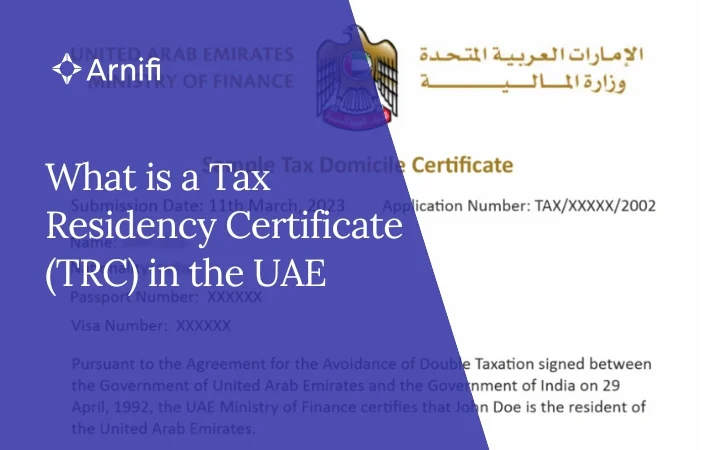DTA Agreements: A Guide to UAE’s Tax Treaty Network
by Manu Midha Dec 12, 2023  10 MIN READ
10 MIN READ
Understanding Double Tax Avoidance (DTA) agreements is crucial to avoid paying taxes twice on the same income. In this blog, we will provide a comprehensive guide on DTA agreements and their importance in international trade.

We will also delve into UAE’s commitment to DTA agreements and the benefits they offer for businesses. Furthermore, we will provide an overview of UAE’s tax treaty network, including key countries and significant provisions in the DTA agreements. Applying for DTA benefits in UAE can be tricky; hence we have included eligibility criteria and steps to apply for them. We will also discuss the implications of DTA agreements on foreign investments and domestic businesses in the UAE. Lastly, we will explore whether DTA agreements are beneficial for small businesses in the UAE and provide you with a list of countries that are part of the DTA agreement network.
Understanding Double Tax Avoidance (DTA) Agreements
Double Tax Avoidance (DTA) agreements play a crucial role in international trade by aiming to prevent the avoidance of double taxation for income. These agreements offer relief and ensure fair taxation, promoting transparency in tax matters and tax purposes. Additionally, they help determine tax residency and facilitate international trade and investment. By preventing tax evasion and avoidance, DTA agreements contribute to a clearer understanding of tax obligations, benefiting both countries involved. This clarity fosters an environment conducive to international business and economic growth, in accordance with the guidelines set by the OECD Model Tax Convention.
What are DTA Agreements?
DTA agreements, also known as Double Tax Avoidance agreements, are international treaties between countries. They serve to prevent double taxation and ensure clarity for tax authorities. These agreements often include provisions for preferential tax rates and play a crucial role in promoting foreign investments and trade relations.
Importance of DTA Agreements in International Trade
DTA agreements, pivotal in nurturing economic cooperation between nations, create an enabling environment for cross-border business activities. By reducing tax barriers and fostering certainty for taxpayers engaged in international trade, these agreements promote global trade and investments while also safeguarding human rights. Moreover, they safeguard the rights of taxpayers involved in international trade activities, thereby contributing to the development of a transparent and fair international tax system, ultimately benefiting the global economy.
UAE’s Commitment to Double Tax Avoidance
The UAE’s active engagement with other countries in the avoidance of double taxation underscores its dedication to international tax principles, promoting fair taxation and global trade relations. These agreements align with the UAE’s economic strategy by attracting foreign investments, fostering trade, and demonstrating its global economic integration. The commitment also reflects UAE’s efforts to create a conducive environment for cross-border business activities, further contributing to a fair and transparent tax system.
Role of DTA Agreements in UAE’s Economic Strategy
DTA agreements play a significant role in supporting UAE’s economic diversification and global integration. By creating an attractive tax environment for businesses, the UAE leverages these agreements to enhance its position as an international business hub. This, in turn, aligns with the country’s strategy to promote trade and economic cooperation on a global scale, in line with the United Nations’ goals. Additionally, DTA agreements facilitate cross-border investments, contributing to UAE’s efforts to strengthen its economic vision and boost international competitiveness.
Benefits of DTA Agreements for UAE Businesses
UAE businesses benefit from these agreements by gaining relief from double taxation, thus enhancing their competitiveness. These agreements offer legal certainty for businesses operating in foreign markets and provide opportunities for tax exemptions and reduced rates. Furthermore, DTA agreements protect UAE businesses from discriminatory tax treatment abroad, helping them mitigate tax risks and optimize international operations. This fosters an attractive tax environment for businesses in the UAE, aligning with the country’s economic strategy and global integration.
Overview of UAE’s Tax Treaty Network
The UAE’s comprehensive tax treaty network comprises a wide range of Double Taxation Avoidance Agreements, promoting international trade and economic cooperation. These agreements contain provisions to prevent the double taxation of income, demonstrating the UAE’s commitment to nurturing robust tax relations with other nations, including Saudi Arabia, India, and other countries. By providing a framework for mitigating tax burdens in foreign jurisdictions, the network empowers UAE businesses to thrive in global markets while embracing the avoidance of double taxation.
Key Countries in UAE’s Tax Treaty Network
UAE’s tax treaty network encompasses agreements with strategically important countries, including major trade partners and investment destinations such as Pakistan, Qatar, and the United States, which experienced a diplomatic crisis in June 2017. These agreements offer UAE businesses tax certainty and benefits, ensuring that income earned in these countries is not subject to double taxation. By supporting economic ties with significant international partners, these agreements play a crucial role in fostering the UAE’s global economic relations and growth.
Significant Provisions in UAE’s DTA Agreements
UAE’s DTA agreements involve the fair allocation of taxing rights between countries, addressing the treatment of income from international business activities. They also include provisions to resolve tax disputes and prevent avoidance of double taxation while offering clarity on tax matters. Additionally, the agreements outline the procedures for applying for DTA benefits in UAE, contributing to the country’s commitment to tax transparency and international cooperation, particularly in determining the country of residence for tax purposes.
ALSO READ: How to register as a supplier or vendor with SABIC?
Applying for DTA Benefits in UAE
Businesses operating in the United Arab Emirates have the opportunity to seek relief from double taxation by applying for benefits under Double Tax Avoidance (DTA) agreements. Eligibility for these benefits is determined by the criteria specified in the relevant agreements, and businesses can receive guidance from tax authorities throughout the application process. The advantages of DTA benefits include the reduction of tax liabilities for UAE enterprises involved in international trade, aligning with the country’s commitment to optimizing tax positions through its extensive tax treaty network. To be eligible for DTA benefits, the applicant must be a tax resident of a country that has an effective DTA with the UAE.
Eligibility Criteria for DTA Benefits
To avail DTA benefits, understanding the eligibility criteria is crucial. These benefits are provided based on specific criteria to ensure fair taxation practices and prevent double taxation. Meeting the eligibility criteria is essential to leverage the advantages of DTA agreements, aligning with international tax standards. The criteria are established to prevent tax avoidance and align with the UAE’s commitment to upholding fair and transparent taxation practices.
Steps to Apply for DTA Benefits
Applying for DTA benefits necessitates meticulous completion of an application process, aligned with the guidelines outlined in the agreements. Understanding and fulfilling specific documentation and formalities is crucial to successful DTA benefit claims. It ensures compliance with tax regulations and adherence to the stipulated guidelines, ultimately preventing tax avoidance and double taxation. Effective availing of DTA benefits requires a comprehensive understanding of the procedures, showcasing the importance of careful completion of the application process.
Implications of DTA Agreements on Business Operations
DTA agreements play a significant role in shaping the tax landscape for international business operations. Understanding these implications is vital for strategic tax planning, as DTA agreements impact the tax treatment of cross-border business transactions, directly affecting operational costs. By streamlining tax implications, DTA agreements create a favorable environment for international trade, encouraging businesses to optimize tax efficiencies. This has a substantial influence on foreign investments in UAE and the operations of domestic businesses, as a permanent establishment (PE) can be defined as a fixed place where the business of an enterprise is carried out in a given country. Therefore, it is essential for businesses to grasp the intricacies of these agreements.
Impact on Foreign Investments in UAE
The impact of DTA agreements on foreign investments in the UAE is significant, influencing the taxation of such investments. Understanding this impact is crucial for investment planning as these agreements create a framework that directly affects the tax treatment of foreign investments in the UAE. Leveraging the benefits of DTA agreements, including permanent establishment and beneficial owner status, positively influences the attractiveness of the UAE for foreign investments by providing clarity and certainty for foreign investors regarding tax implications. This clarity helps in decision-making and fosters a conducive environment for foreign investments.
Influence on UAE’s Domestic Businesses
DTA agreements in the UAE have a direct impact on tax implications for domestic businesses. Understanding this influence is crucial for tax compliance and effective financial decision-making. It fosters an environment of tax certainty, enabling businesses to plan effectively. By comprehending the influence of DTA agreements, domestic businesses can optimize their tax planning strategies. This ensures they benefit from avoidance of double taxation and make informed decisions about their tax treatment, ultimately creating a conducive environment for business operations in the UAE.
Are DTA Agreements Beneficial for Small Businesses in UAE?
DTA agreements can be highly advantageous for small businesses in the UAE. They offer specific benefits that optimize tax efficiencies, mitigate tax implications, and promote growth and sustainability. Leveraging DTA agreements allows small businesses to engage in international trade with favorable tax treatments, creating a conducive environment for development.
List of countries in the list of DTA agreements
The UAE’s DTA agreements encompass a wide range of countries, including Egypt and Oman, promoting cross-border business activities. This diverse list signifies the UAE’s commitment to nurturing international trade relationships and its proactive approach to global tax cooperation. Take a look at the following list to understand which countries are in DTA agreements with the UAE.
Conclusion
In conclusion, understanding these agreements and their implications is crucial for businesses operating in the UAE. These agreements play a key role in facilitating international trade and attracting foreign investments to the country. UAE’s tax treaty network includes important countries that offer significant provisions for businesses seeking DTA benefits. Applying for these benefits requires meeting eligibility criteria and following specific steps.
While DTA agreements primarily benefit large-scale businesses, their implications on small businesses in the UAE should also be considered. It is important for entrepreneurs and investors to stay informed about the countries included in the list of Double Tax Avoidance agreements to make informed decisions and optimize their tax planning strategies.
About Arnifi
Arnifi is digital first Corporate service provider helping companies enter the Middle East region, starting with UAE and Saudi Arabia markets. Founded and backed by professionals from Amazon, Souq and other large companies operating in KSA – the team understands what it takes to succeed as a startup in both UAE and Saudi Arabian markets, apart from going through the setup process multiple times. Arnifi will provide a truly digital experience to entry and scale up of companies both UAE and Saudi Arabia. The Arnifi promise is simple, yet revolutionary, use technology and a great team to provide transparency, efficiency and great customer experience in the whole process. Check out at – www.Arnifi.com for more details.
ALSO READ: UAE’s best free zones for businesses
Top UAE Packages

Related Articles
Top UAE Packages



